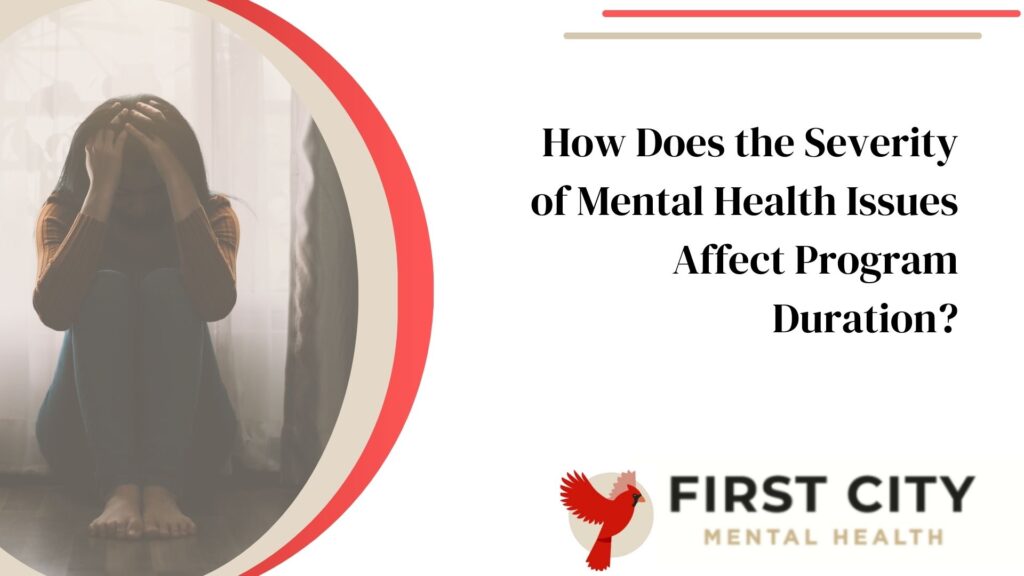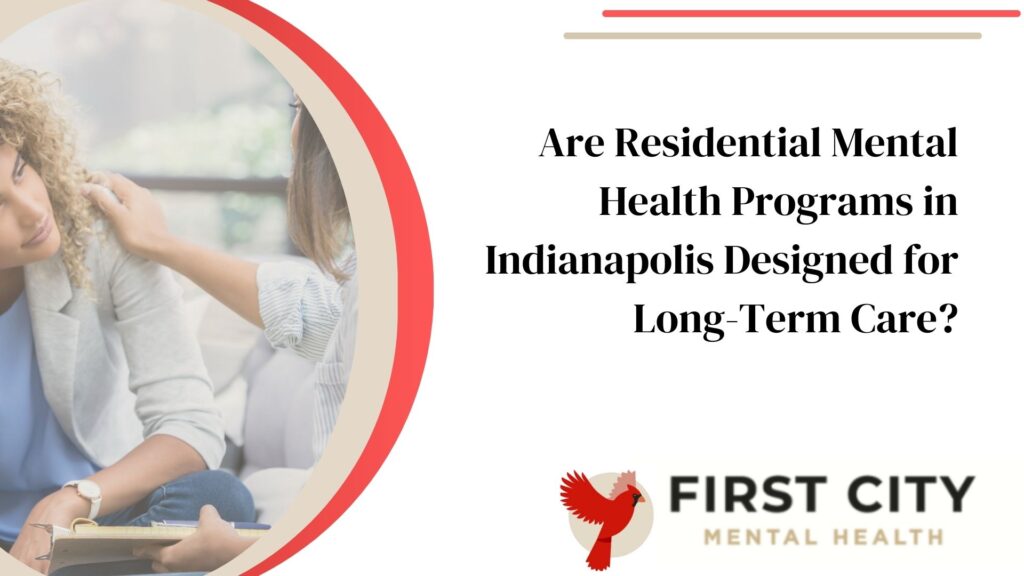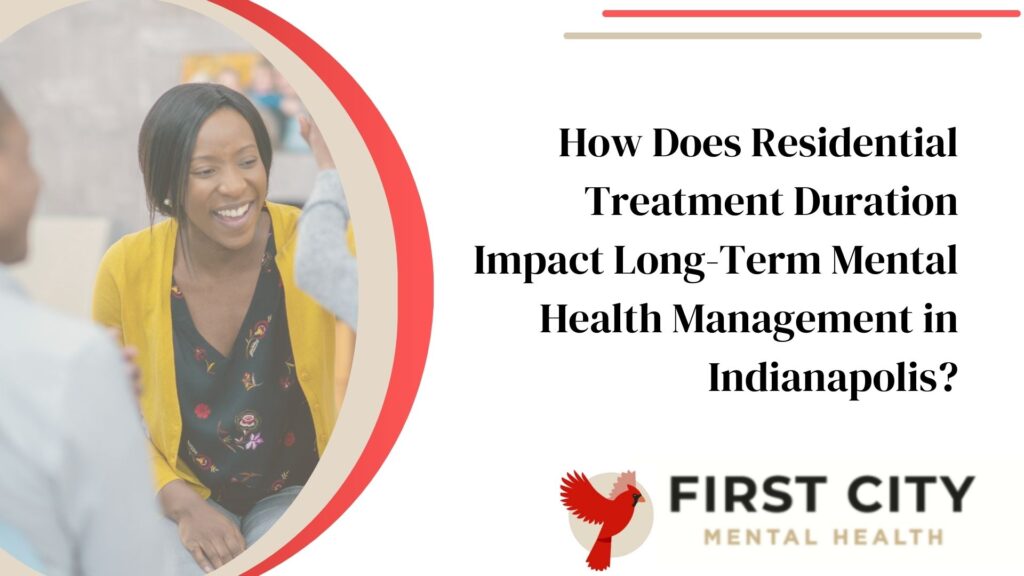
What Makes a High-Quality Mental Health Facilities in Indianapolis?
January 14, 2025
How Long Do Adult Intensive Outpatient Program Typically Last in Indianapolis?
January 14, 2025Deciding on the right mental health treatment in Indianapolis can be hard. Many people are unsure how long they need to stay in a program to get better. One fact stands out: the stays for residential mental health programs in Indianapolis often range from six to nine months.
This time allows individuals to truly heal.
This will look at how long different programs last and what affects that time. We will explore everything from the severity of one’s condition to options for extending a stay.
Find answers here if you’re seeking help.
Let’s start your journey to understanding better.
Key Takeaways
- Residential mental health programs in Indianapolis last between six and nine months. This duration helps individuals deeply engage in recovery.
- The length of stay is decided by factors such as the person’s specific needs, treatment plans, and severity of their condition.
- Facilities like Progress House offer long-term care for several months to support sustained recovery.
- Some residential treatments can be short, lasting from 5 to 7 days, focusing on immediate issues like acute psychiatric crises.
- Treatment durations may extend based on individual progress and assessments, providing flexibility for deeper healing without a strict timeline.
What Is the Typical Duration of Residential Mental Health Programs in Indianapolis?
Residential mental health programs in Indianapolis typically last between six and nine months. This duration provides a substantial period for individuals to engage deeply in their recovery journey.
Each program tailors its length of stay to the needs of its residents, allowing for comprehensive treatment without rushing the healing process. Facilities like Progress House, known as Indiana’s oldest and largest recovery residence organization, emphasize long-term care that supports sustained recovery.
The length of residential mental health treatment varies significantly depending on individual needs but often spans several months to ensure deep and enduring healing.
How Do Residential Mental Health Programs in Indianapolis Determine Length of Stay?
After grasping the usual duration of residential mental health programs in Indianapolis, it becomes necessary to understand how these programs set the length of stay for individuals.
Each person enters a program with distinct needs and challenges influencing their recovery path. In Indianapolis, professionals at residential mental health facilities Indianapolis form a treatment plan specific to each person’s distinctive conditions and targets.
The plan brings together numerous services such as day treatment, taking into account essential factors like the person’s condition severity and progress in therapy. For instance, residents might have extended stays since it provides lasting care aimed at comprehensive recovery.
Deciding the length of stay largely relies on regular assessments and personalized care for one’s healing journey. Staff members closely watch residents’ progress via individual therapy sessions which occur weekly, and modify the treatment plans as needed.
For patients who require acute inpatient treatment, for example, their program commonly ranges from 5-7 days as per immediate stabilization requirements. The focus centers on not just alleviating current symptoms but also strategizing ongoing support post-discharge, ensuring that transitions from various stages within facilities are uninterrupted and cater directly to maintaining long-term well-being beyond preliminary treatments.
How Does the Severity of Mental Health Issues Affect Program Duration?

The severity of mental health issues plays a crucial role in determining the duration of residential treatment. More severe conditions often require longer stays, allowing individuals to gain essential skills for recovery.
In Indianapolis, typical durations range from a few days to several months based on these needs. For instance, adult acute inpatient treatment programs usually last 5-7 days but may extend if patients face significant challenges.
Mental health in Indianapolis assesses individual cases thoroughly. They create customized treatment plans that consider each person’s situation and progress. Long-term care can be necessary for those with intricate mental health issues.
Programs like Progress House offer extended services to support deeper healing over time. Emotional stability improves as individuals engage in therapy regularly and build coping mechanisms during their stay.
What Factors Influence the Duration of Mental Health Treatment in Indianapolis?
Residential mental health treatment in Indianapolis can have a very short duration. Some programs allow stays as brief as a few days. These shorter options usually cater to specific needs, such as addiction treatment.
They focus on immediate support and intervention. For instance, adult acute inpatient treatment typically lasts around 5-7 days. In contrast, residential mental health programs often extend from one week to several months, depending on individual circumstances.
Providers determine the length based on each person’s unique treatment plan. This ensures that everyone receives the appropriate care suited to their situation. The flexibility in duration allows individuals to engage deeply with their healing process when necessary.
Understanding these timeframes helps people seeking mental health treatments in Indianapolis make informed decisions about their care options. Next, we will explore how residential mental health programs establish the length of stay for individuals.
Are Residential Mental Health Programs in Indianapolis Designed for Long-Term Care?

Many residential mental health programs in Indianapolis focus on long-term care. Progress House, for example, stands as the oldest and largest recovery residence organization in Indiana.
It provides extensive support for individuals dealing with mental health issues.
These programs allow residents to stay from a few days to several months. The specific duration depends on each person’s treatment needs. This flexibility offers a chance for deep healing without rushing through the process.
Each facility tailors its services to ensure effective and lasting results for those seeking help in Indianapolis.
Can the Duration of a Residential Program in Indianapolis Be Extended?
Residential and the best mental health facilities in Indianapolis can extend their duration based on individual needs. The treatment plan often dictates the length of stay. Some residents may require a longer period to achieve stability and healing.
Programs like Progress House offer long-term residential services, supporting individuals for several months or more.
The severity of mental health issues also plays a role in determining whether an extension is necessary. Facility staff regularly assess progress and make recommendations accordingly.
Individuals focused on recovery may benefit from this additional time for therapy and support without the pressure of a strict timeline.
How Does Residential Treatment Duration Impact Long-Term Mental Health Management in Indianapolis?

Long-term mental health Indianapolis often hinges on the duration of residential treatment. Programs typically last between six and nine months, providing ample time for individuals to heal.
Such extended stays allow participants to undergo intensive therapy and build essential coping skills. The focused environment offers support from therapists and peers alike, enabling residents to concentrate fully on their recovery journey.
Shorter durations may not afford the same depth of care. For example, adult acute inpatient treatment programs usually last only 5-7 days. While these can address immediate crises, they often lack the comprehensive approach needed for lasting change.
Mental health facilities in Indianapolis understand that a longer stay helps nurture resilience among residents, benefiting them in their ongoing mental health management after discharge.
Conclusion
Residential mental health programs in Indianapolis vary widely in duration. Typical stays range from six to nine months. Some programs last only a few days or weeks, depending on individual needs with mental health therapist Indianapolis.
Factors like treatment plans and severity of issues often determine the length of stay. Long-term care options do exist, particularly at places like First City Mental Health. Treatment duration can be adjusted based on progress and ongoing assessments.
These programs offer a vital opportunity for healing and support, leading to improved long-term management of mental health challenges.
Consider exploring more resources for guidance on finding suitable mental health facilities in Indianapolis. Take that step today toward better understanding your mental wellness options! Your journey matters, and seeking help is a strong choice for personal growth and recovery.
FAQs
What are residential mental health programs in Indianapolis?
Residential mental health programs in Indianapolis refer to comprehensive, live-in treatment plans offered by the best mental health facilities in the city. These facilities provide professional care and therapeutic services for individuals struggling with various mental health conditions.
How long do these residential mental health treatments usually last?
The duration of residential mental health treatment varies widely based on individual needs and specific program guidelines set by each facility. However, most commonly, these programs range from a few weeks to several months.
Are there different types of residential programs available at Indianapolis’ top-rated facilities?
Yes, the best mental health facilities in Indianapolis offer an array of specialized residential programs tailored to treat various disorders under expert supervision of experienced therapists.
How can one decide which type of program is suitable for their needs?
Deciding on a suitable program often requires consultation with a knowledgeable mental health therapist in Indianapolis who can assess your condition accurately and recommend appropriate treatment options.






